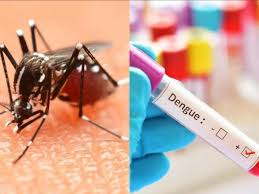Nashik Residents Penalized for Dengue Breeding Sources as Cases Reach 198
By Chitra | Updated: June 27, 2024 18:26 IST2024-06-27T18:26:26+5:302024-06-27T18:26:46+5:30
Despite the onset of the rainy season, Nashik has yet to receive substantial rainfall, posing challenges for the Municipal ...

Nashik Residents Penalized for Dengue Breeding Sources as Cases Reach 198
Despite the onset of the rainy season, Nashik has yet to receive substantial rainfall, posing challenges for the Municipal Health Department. As epidemic diseases, notably dengue, surge, the city has recorded over 198 cases of dengue patients, intensifying concerns.
The dengue risk in Nashik is increasing, prompting the Health Department to launch intensive measures to curb the outbreak. In response, the Municipal Corporation's Health Department has fined three residential societies and construction sites identified as dengue sources a total of Rs. 13,000. This enforcement action took place in the Pathardi Phata area of the city, where the NMC Health Department had previously issued warnings to these residents to avoid fines. Moreover, notices have been sent to 85 individuals as part of these efforts.
From January to June, the number of dengue patients has significantly increased, reaching 198. Alarmingly, 94 new cases have been reported in the current month alone. Last June, there were only 33 cases of dengue, highlighting the severity of this year's outbreak. Last year, there were 130 cases between January and June, whereas this year, the figure has risen to 198 during the same period.
To curb the spread of dengue, the Health Department is actively identifying and destroying mosquito breeding sites through smoke spraying. Despite the lack of heavy rains, the number of dengue cases in June has surged to 94, making Nashik a hotspot for the disease. The Health Department has urged citizens to prevent water from accumulating in puddles around their homes, as dengue mosquitoes breed in clean water. “ We have observed most of the breeding spots in constructions sites majorly. In residential sites the breeding spots are mostly identified in freeze trays, cooler tanks, small in-house plants pots etc. All households including the upper class and luxurious societies should pay attention of these spots, we have observed that the show pieces, fish tanks, the water pots placed on terrace or balcony for birds and plant pots in a neat and clean houses are the breeding spots and they get easily ignored.” Informed Dr Nitin Rawate, Dengue and Maleria Department head.
With over 198 dengue cases reported even before the onset of heavy monsoon rains, there is a concern that the number of cases will continue to rise during the rainy season. Water accumulation in the city, along with garbage heaps in drains, is creating ideal conditions for mosquito breeding. The Health Department remains on high alert, working tirelessly to prevent further outbreaks.
Open in app